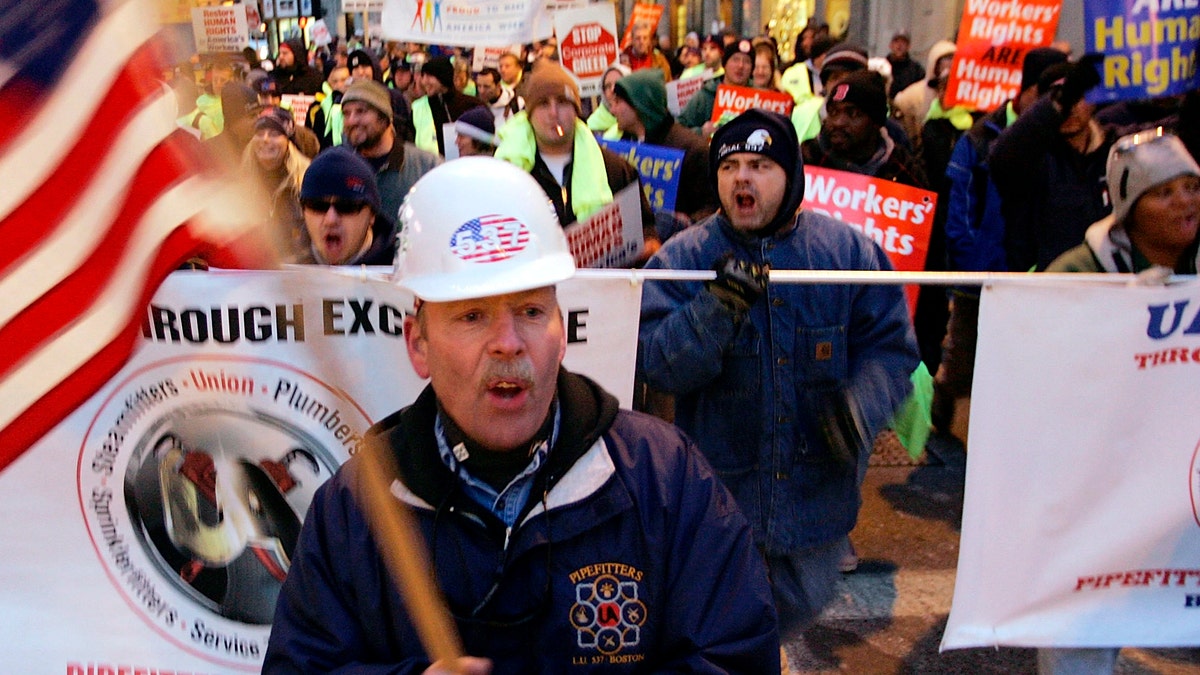
BOSTON - DECEMBER 08: Martin Downey, the president of a local union, waves an American flag as he marches with other AFL-CIO members December 8, 2005 in Boston, Massachusetts. The march was part of an effort by unions this week to try to energize the labor movement. (Photo by Joe Raedle/Getty Images) (2005 Getty Images)
It was one of the parts of the comprehensive immigration reform bill of 2007 that torpedoed its chances of passing.
For a long time, labor unions were firmly opposed to the notion of them. They often locked horns with business groups, who favored them.
But now guest workers are a key component of the new push for a comprehensive reform of the U.S. immigration system.
And unions are one of the groups most forcefully advocating for a guest worker program that will make it easier for them to come to the country, and for employers who need them to be able to bring them here. A key motivator for unions is that their viability and membership may depend more and more on immigrant workers – Latino union membership grew 21 percent over the last decade, while white, non-Latino membership dropped by 13 percent.
Now, labor and business are working together on the issue that so bitterly divided them.
The Chamber of Commerce and the AFL-CIO have been tasked by Democratic Sen. Charles Schumer of New York with reaching a deal, within weeks, that Schumer and a bipartisan Senate group on immigration could incorporate into legislation now taking shape, officials say.
Both sides appear hopeful, although Schumer and others say the issue scuttled the last attempt at a comprehensive overhaul of immigration law in 2007.
This time around, officials involved hope for a better result, in part because all involved see the clear necessity of addressing what's called "future flow" — the influx of migrants to the U.S. that's sure to come whether or not Congress passes an immigration bill.
If Congress does act to provide a pathway to citizenship for the estimated 11 million undocumented immigrants already in this country, it's just as important to deal with future immigration, advocates say.
Otherwise, some time from now the country will once again find itself home to many more undocumented immigrants.
"We're at a point where we have to take that issue really seriously and think about what kind of a system do we want to have in place so that 10 years from now, 15 years from now, we're not in the same situation," said Ana Avendano, assistant to the AFL-CIO president for immigration and community action.
The guest worker issue has emerged as a split between the Senate negotiating group and President Barack Obama, who omitted any such program from his immigration proposals, drawing criticism from Sen. Marco Rubio of Florida, a key negotiator on the Republican side.
Labor and business leaders were meeting Obama at the White House on Tuesday in separate sessions to discuss a wide range of issues, including immigration reform and how it fits into the broader economic picture.
Also on Tuesday, the House Judiciary Committee was holding its first hearing on immigration, and guest workers were expected to be one of the dominant topics.
In his opening remarks at the hearing, Rep. Bob Goodlatte, (R-Va.), the chairman of the House Judiciary Committee, said: "Our laws also erect unnecessary hurdles for farmers who put food on America’s tables. Our agriculture guestworker program is simply unworkable and needs to be reformed."
The Chamber of Commerce "views the existence of a temporary worker program as vital to a comprehensive immigration bill," spokeswoman Blair Latoff Holmes said in a statement.
The U.S. does have several temporary worker programs already, but they're viewed as cumbersome and outdated, and experts say the majority of migrant workers in agricultural and other low-skill fields like landscaping or housekeeping are undocumented.
For business and labor, the question is how to come to an agreement on how many workers to let in and under what circumstances, how much they would be paid, and whether and how they would be able to attain eventual permanent residency, the critical step toward citizenship.
"Few aspects of immigration law are so divisive in terms of where the two sides stand," said Demetrios Papademetriou, head of the nonpartisan Migration Policy Institute.
That institute and others have proposed creation of a permanent commission that would make recommendations about where and when workers are needed, an idea said to be under consideration as the business and labor groups negotiate.
The bipartisan Senate group has outlined parameters that would allow employers to hire immigrants if they could show they couldn't find an American for the job, and would respond to economic conditions by allowing more immigrants into the country at times of low unemployment, and fewer when unemployment is high.
The Associated Press contributed to this report.
Follow us on twitter.com/foxnewslatino
Like us at facebook.com/foxnewslatino




